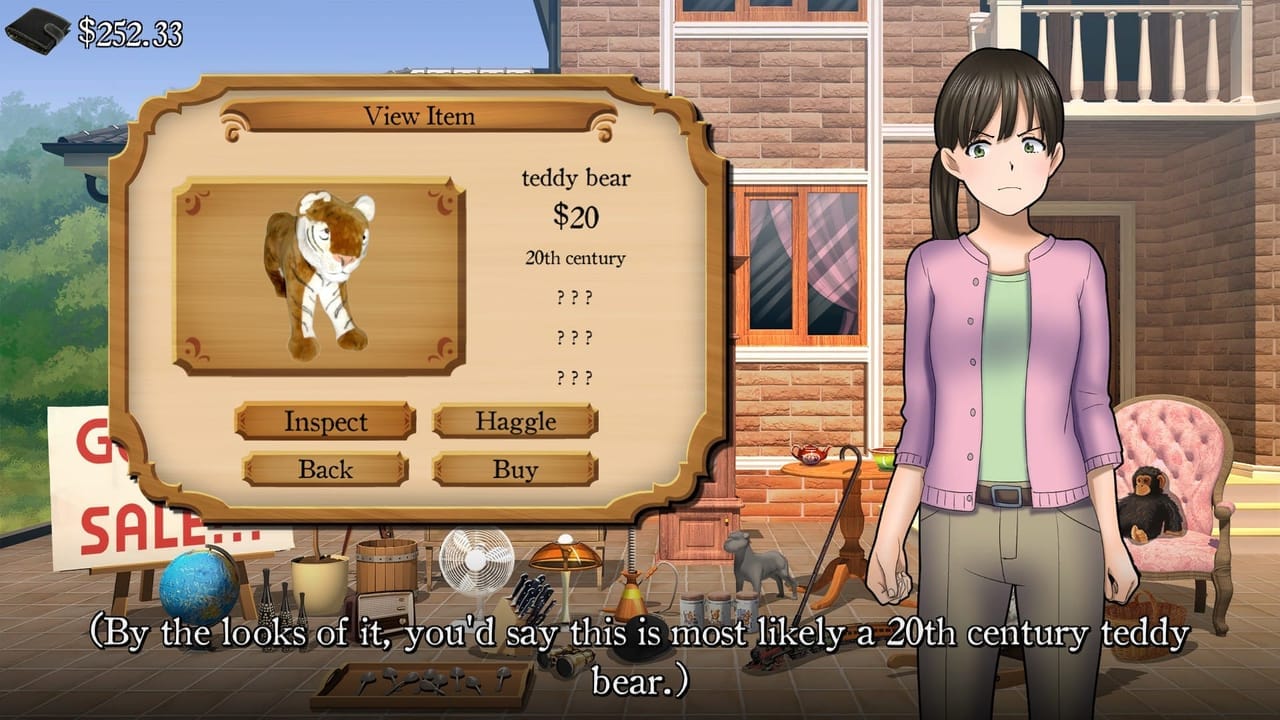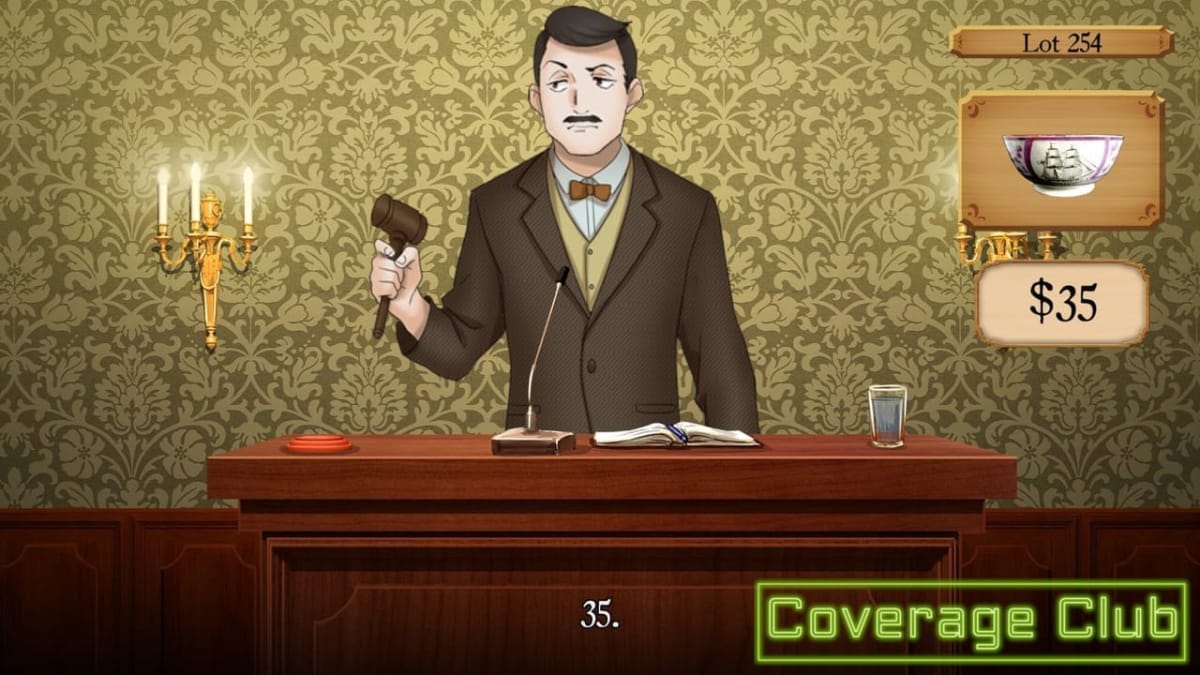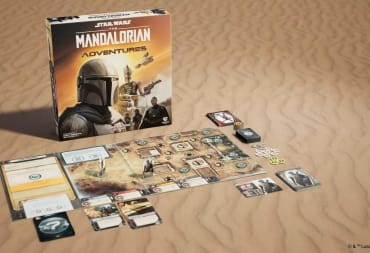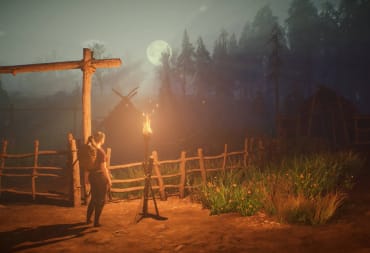It's #loveindies time, which means that TechRaptor is going all in on indie game coverage! That means previews, reviews and a bunch of new Coverage Club entries from our review team all week. Keep checking the site for a slew of articles talking about smaller releases that need more attention.
If you're the sort of person who watches Antiques Roadshow, Pawn Stars, or Storage Wars, then Silver Cow Studio's Bargain Hunter might be the game for you. It establishes a simple premise: you'll head out to thrift shops and yard sales in search of hidden treasures. Purchase some quality items and you'll clean up at auctions. Fail to manage your finances and you'll lose the game. It's a fantastic idea (and a compelling game), but the execution is terribly flawed.
Let's start with the good: the gameplay loop is fantastic. Go to places to find items, pick out what you think is good (either on instinct, their appearance, or through inspecting them). Sell those items at auction for a profit (hopefully). Take your profits to buy more items, upgrade your home, etc. It's simple, but it works.

The downsides, however, are many — and some of them are terribly frustrating. One problem I personally encountered was that this seemingly-simple Unity game was absolutely burying the needle on my CPU and GPU. The game ran fine 99% of the time, but I've played games that were much more graphically intense that didn't tax my system nearly half as much. (And my computer is no slouch, either — I have a Core i5 6500 and an EVGA GTX FTW 1070).
Secondly, the bills. Goodness, the bills. Bills randomly pop up (seemingly with no predictable schedule in the several in-game months that I played). I've encountered bills for groceries, car fuel, car insurance, house insurance, water, gas, electric, telephone, Internet, and vehicle repairs. These drain your money (just like in real life), but you have no idea when they are coming. This is an element of your life that should be wholly predictable (save for the oddities like vehicle repairs), but you just won't know when they'll be coming in.
The lack of an in-game calendar compounds the trouble with bills. This is an oversight that makes managing your time frustrating. I'd love to be able to know at a glance when the next auctions and garage sales are. Instead, I have to click around a bunch of menus and mentally keep track or take notes.
[gallery link="file" size="full" ids="298591,298592,298593"]
The auctioning process in Bargain Hunter first requires that your items are appraised. Those that pass enter in the auction and you'll get a summary of how well you did after it's over.
Another way the game fails with keeping track of things is in the auctions. I encountered three tiers of auctions. One with a minimum value of $5, a second tier with a minimum value of $75, and the third tier with a minimum value of $150. After you purchase items, you can have up to six appraised at one time for one of these auctions. Items will either pass (and be automatically added to the next auction), fail (and be returned to your inventory), or be discovered to be a fake (which also causes them to return to your inventory).
Once you have more than three or four items, it's difficult to remember which items you've submitted for auction and failed to pass and which you have not. It should have been an easy matter of tagging them with things like "failed appraisal for $75 auction" or "This item is a fake". I instead resorted to taking notes.
Aside from the lack of information in this area, a critical gameplay mechanic isn't explained well. You can upgrade your house by purchasing furniture and renovating it. What the game doesn't tell you is that these upgrades will improve your haggle and inspection skills. You don't even know which of the two skills these items will improve until you buy them.
Finally, your profit and loss in Bargain Hunter are recorded in a simple ledger that shows money in, money out, and your balance at the time. Auctions will provide a helpful invoice, but you only get to see this once. For a game that's so concerned about money, you'd think that it would do a better job of representing your finances. Flow charts, graphs, spreadsheets — give me something more robust, please!

Bargain Hunter piqued my interest and it had plenty of potential. The idea of scouring thrift shops and yard sales for junk only to sell them for a tidy (and occasionally massive) profit is really appealing. Especially to someone like me who grew up watching stuff like Antiques Roadshow.
I spent two hours playing Bargain Hunter. I found the gameplay very compelling, but the execution of the idea is so mediocre that I can't really recommend that you pick it up.
TechRaptor covered Bargain Hunter on PC via Steam with a copy provided by the developer.
Have a tip, or want to point out something we missed? Leave a Comment or e-mail us at tips@techraptor.net






